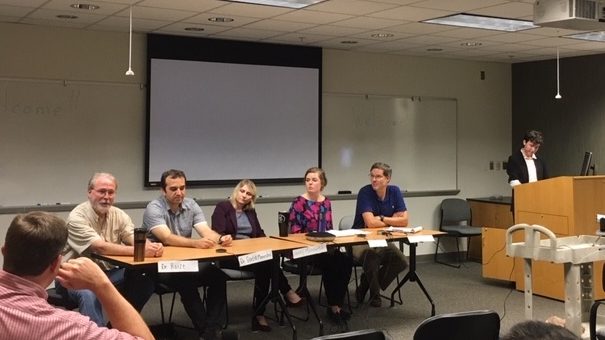Seminar Panel Discusses Fire Management in a Changing Climate

This post was written by Bonnie Myers, 2018-19 Global Change Fellow. It summarizes the first of the Global Change Seminar series organized by the Global Change Fellows on October 11, 2018, A panel discussion on fire and its effects on human and ecological communities in a changing world.

Panelists:
Dr. Fernando Garcia Menendez, NCSU, Department of Civil, Construction, and Environmental Engineering
Dr. Christopher (Chris) Moorman, NCSU, Department of Forestry and Environmental Resources
Honey Minkowitz, NCSU, School of Public and International Affairs
Daisy Mills, NCSU School of Public and International Affairs
Dr. Joseph Roise, NCSU, Department of Forestry and Environmental Resources
Moderator: Laura Hamon, NCSU, Departments of Applied Ecology/Entomology & Plant Pathology
Seminar Summary

Fire management in the United States is already a difficult task in that it involves managing not only the natural resources but also educating and informing citizens on appropriate fire management and response. In the context of climate change, new obstacles and factors must be considered in fire management planning, mitigation, and public education. To highlight the added complexity that global climate change brings to fire management, specifically in the Southeast U.S., the Southeast Climate Adaptation Science Center brought together experts in the fire management field with backgrounds in environmental engineering, public affairs, and forest resources to discuss additional risks and strategies in a changing climate.
Prescribed fire is one potential tool to mitigate the effects of climate change on wildfires; however, time of year, weather conditions, and weather forecasts and predictions must all be considered when determining timing of burns as even small increases in rain affect if burning will be effective. Agencies have started communicating the importance of prescribed burning and wildfires to ecosystems and fire management to communities. Prescribed fire events such as Fire Festivals (Fire in the Pines Festival) and social media campaigns, like that conducted by the Fire Chasers, have been successful in educating and informing the public on management plans and their importance. Other supplemental fire management tools in addition to prescribed fires include mowing, herbicides, mechanical removal, and even using goats to reduce plant biomass.
Increasing urbanization is also a major aspect to consider in fire management, which presents added challenges to fire management and requires more community engagement, especially as climate change is expected to affect intensity of extreme weather events, such as wildlife and drought. Ultimately, fire managers and agencies must build meaningful and long-term relationships with both rural and urban communities to increase education about fire management and risk of wildfires. Luckily, North Carolina in particular is in a unique and promising situation where not only the federal and state agencies but private, non-governmental organizations and communities are on board with fire management. These groups foster positive communication and collaboration to manage fire effectively for human safety, biodiversity conservation, and ecosystem health.
A full recording of the panel discussion was not captured due to technical difficulties. Partial recording of the seminar is available upon request.
- Categories:
